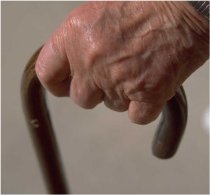
Why some older people experience a rapid decline in their physical and functional health while some of their peers remain healthy and active is a mystery only partly explained by genetic make-up. Two studies appearing in the journal Psychology and Aging show how psychosocial factors can also play an important role.
In the first study, University of Texas researchers found a link between positive emotions and the onset of frailty in initially non-frail older Mexican Americans living in the U.S. southwest. This was the first study to examine frailty and the protective role of positive emotions in the largest minority population in the United States. Researchers Glenn Ostir, Kenneth Ottenbacher and Kyriakos Markides followed the participants for seven years and assessed frailty by measuring the participants’ weight loss, exhaustion, walking speed and grip strength. Positive affect (positive emotions) was measured during the study period by asking the participants how often in the last week “I felt that I was just as good as other people,” “I felt hopeful about the future,” “I was happy,” and “I enjoyed life.” The incidence of frailty increased almost eight percent during the seven-year follow-up period, but those who scored high on positive affect were significantly less likely to become frail. Each unit increase in baseline positive affect score was associated with a three percent decreased risk of frailty after adjusting for relevant risk factors.
The precise reason for this outcome was beyond the scope of the current study, but the researchers speculate that positive emotions may directly affect health via chemical and neural responses involved in maintaining homeostatic balance.
The study also provides evidence that older adults can control the effect of negative stereotype activation but only when the primes are relatively subtle. In contrast, when the stereotype primes are relatively blatant, memory performance tends to be negatively affected. The results of this study add to a growing list of findings that implicate the importance of the social environment in how it affects older peoples’ memory performance, according to the authors. If older people are treated like they are competent, productive members of society, then they perform that way too.


















Comments are closed.